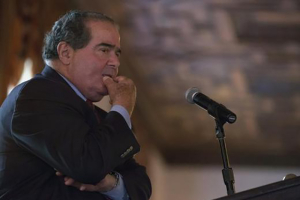U.S. government having to be neutral about religion is not supported by the Constitution and is not rooted in American history, Supreme Court Justice Antonin Scalia said Saturday at a speech at a Catholic high school in Louisiana.
"God has been very good to us," Scalia stated, according to the Times-Picayune. "One of the reasons God has been good to us is that we have done Him honor."
Stemming from the Catholic faith, Scalia is considered one of the court's more conservative members.
As the longest-serving justice currently on the court, Scalia is the senior associate justice. Appointed by President Ronald Reagan in 1986 to fill the associate justice seat vacated when Justice William Rehnquist was elevated to Chief Justice, Scalia has been described online as the intellectual anchor for the originalist and textualist position in the court's conservative wing.
Scalia calls himself as an originalist, meaning he interprets the Constitution of the United States as it would have been understood when it was adopted. "It's what did the words mean to the people who ratified the Bill of Rights or who ratified the Constitution," he maintains.
On Saturday, he said the First Amendment prohibits government from endorsing one religion over another. But, he added, that doesn't mean the government has to favor non-religion over religion. He contended the non-religion stance is a more modern reading originating in the courts in the 1960s.
"To tell you the truth, there is no place for that (idea that the state must be neutral between religion and its absence) in our constitutional tradition. Where did that come from?" he posed, reports The Denver Post.
"To be sure, you can't favor one denomination over another, but can't favor religion over non-religion?"
He also said there is "nothing wrong" with presidents and others invoking God in speeches, according to The Associated Press.
If Americans want government to be non-religious, he said, they should vote on it instead of courts deciding, reports The Hill.
"Don't cram it (non-religion) down the throats of an American people that has always honored God on the pretext that the Constitution requires it (religious neutrality)," he said, according to the Times-Picayune.
Scalia's remarks are sparking mixed reactions.
One online poster, identified only as "Chuck" asked: "What, in the Constitution, requires one to be 'neutral' when considering matters that may affect our guaranteed Constitutional rights of speech, press, assembly and Religion? How can one be 'neutral' when all our laws must first comport with these freedoms? Indeed we are required to protect them."
Hewitt Rose reacted online that Scalia's viewpoint "is a perfect statement of religious intolerance: freedom of my religion demands intolerance of erroneous religions. If everyone believes that, then we must kill each other, in the name of peace of course."
IllinoisPatriot online suggests everyone "look up the dictionary definition of 'religion'. You will find that non-religion is itself a 'religion' as defined in every dictionary I've used to look up the word. Atheism is a religion as is agnosticism. The constitution forbids the establishment of a state religion, and that INCLUDES atheism and agnosticism."
Scalia was born in Trenton, New Jersey, and attended public grade school before graduating from the Catholic Jesuit Xavier High School in New York City. He attended Georgetown University as an undergraduate and obtained his law degree from Harvard Law School.

















